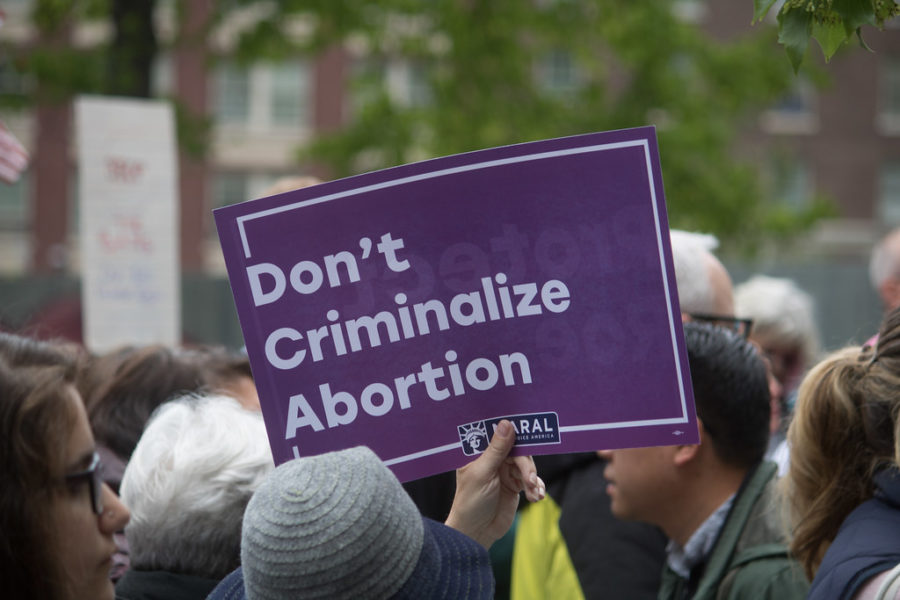Reframing the Way We Think about Abortion
Abortion rights are under fire. Never would I have imagined that the morality and progressivism allegedly characteristic of the 21st century would be so blatantly discarded to trample one of the most fundamental rights to our species, namely, bodily autonomy. The veritable war being waged against abortion—the voluntary removal of an embryo or fetus from one’s body during pregnancy, and therefore a necessary aspect of our bodily governance—rights has been ongoing for decades, primarily perpetuated by the Republican Party. The best way to conceive this battle is as the contest between the pro-life, the movement that believes fetuses qualify as humans and therefore possess the right to life, having implications on women’s abortion access and legality which necessarily terminates the fetus, and pro-choice—the inverse of the former movement—which respectively reside in the Republican and Democratic Party.
With this, though, I want to be clear in the idea I’m trying to express. I believe the pro-life movement and Republican Party and their lawmakers who effect regulatory legislation on abortion themselves are our opposition, not those part of these entities which have the potential for change.
This contest has reached a crescendo since 1973 when Roe v. Wade, one of the most consequential Supreme Court cases to be made, “affirmed that access to safe and legal abortion is a constitutional right,” and Republicans have been working feverishly to overturn this ruling ever since. However, there has been an even more recent and grave curtailment of women’s bodily autonomy, namely, the Texas Heartbeat Act.
As of September 1, 2021, people have been assailed by uncertainty and fear owing to the passage of the Texas Heartbeat Act, a bill passed by the Republican Texas state legislature imposing restrictions on abortion as early as six weeks into pregnancy. Indeed, people fear that this may be the advent of abortion abolition, considering that in so far as one state in a purportedly free union makes abortion illegal, every state comes under threat. And this fear is justified, for this legislation is some of the most draconian to ever be passed.
Gravely, the state of Texas actually deputizes citizens by permitting them to “bring a civil action against any person who… performs a [medically unjustified] abortion… knowingly engages in conduct that aids or abets the performance… of an abortion [including payment or reimbursement by people or even through insurance—they can file against the latter],” or even merely “intends to engage in [an abortion].” They have legal grounds for litigation in so far as physicians “knowingly perform or induce an abortion on a pregnant woman” if fetal heartbeat is present—defined as “cardiac activity” broadly and can be present as early as six weeks in a person’s pregnancy—or if they “[fail] to perform a test to detect a fetal heartbeat” on pain of “injunctive relief sufficient to prevent the defendant from [violating the preventions made in the bill]”—a deliberately unspecified quantity—and “statutory damages in an amount of not less than $10,000 for each abortion performed or… abetted.”
Exceptions are made merely for medical emergency, in which case the statute doesn’t apply if physicians believe there is a medical emergency, meaning abortions for medical emergencies are done at the absolute discretion of physicians. (What prevents them from just not providing it to those who seek abortions?) And should somebody be fortunate enough to find a physician who will approve and subsequently conduct their abortion in the case of a medical emergency, the latter must “execute a written document that certifies the abortion is necessary… and specifies the women’s medical condition requiring the abortion,” which naturally discourages physicians from conducting them. The authoritarianism inherent in this bill finds little precedent and, owing to this virtually unprecedented curtailment of bodily autonomy, it begets considerable debate as to the legality of abortion. The argument can be divided into two principal aspects—the legal and practical import of abortion.
Perhaps more compellingly and uncontroversially than any other argument in favor of abortion legalization—legalizing abortion paradoxically causes less abortions than when it is illegal. Analysis from the Guttmacher Institute yields the following data, that “unintended pregnancy rates are highest in countries that restrict abortion access and lowest in countries where abortion is broadly legal” (and therefore abortion seeking is proportionally higher), and that, excluding China and India, “the abortion rate is actually higher in countries that restrict abortion access than in those that do not.” Additionally, the Center for American Progress asserts that “limiting abortion through various restrictions… [increases] rates of unsafe abortion rather than eliminate the need for it,” and that “limitations [cause] some [to] attempt to have abortions through unsafe methods as a result [of desperation].” Even if you are the most vehement opponent of the practice of abortion, you still have an interest in supporting its legalization, for the practice you detest actually happens less when it is legal. Restricting abortion is counterproductive; abortions still occur if it is illegal, except more frequently and dangerously in unwholesome conditions.
The pro-choice movement must oppose any bill of the Heartbeat Act’s nature in order to not only rescue Texan women from one of the most aggressive and extreme curtailments of bodily autonomy the U.S. has ever seen, but also prevent the normalization, establishment of precedent, and, in so far as these are allowed to occur, the eventual effect of more restrictive abortion bills throughout the country in Republican states. Letting this go uncontested will cause a domino effect of restriction after restriction, leading us into an authoritarian state, the antithesis of the original conception of America, and what we claim to stand for as a society.
If we let this one abortion bill go unchecked, the opposition—namely, Republican and therefore pro-life lawmakers—will interpret it as a weakness, an abdication they’ll capitalize on by proliferating anti-choice legislation that will harm women across our country. It will make pro-life people angry, for it will increase abortion rates when they were promised reduction; and it’ll make pro-choice people angry, for their principal goal will be frustrated. Rather than just letting the pro-life movement thrive and irrevocably establish illegal abortion, at which point the pro-choice movement will be impotent, and pro-life people discontent with the increase of abortion, we ought to unite both those pro-choice and pro-life, and oppose this legislation now, eventually get it repealed and thereby destroy precedent for more flagrant violations of abortion rights and by extension women.
Your donation will support the student journalists of Dublin High School. Your contribution will allow us to purchase equipment and cover our annual website hosting costs.

Matthew Noique is currently a sophomore at DHS. He sees writing as a form of expression and hopes to facilitate that expression as Community section...



































